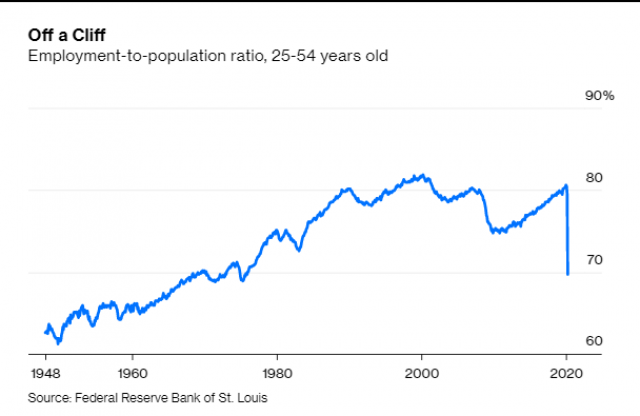The U.S. is now either in or on the verge of an economic depression. In February, more than 80% of Americans between the ages of 25 and 54 had a job; in April, that number was less than 70%, and it probably will fall even more.

And there are plenty of reasons to believe that this situation will not quickly resolve itself once the threat of the coronavirus pandemic has passed. This will be the worst economic deprivation that Americans have suffered since the 1930s. Already, the number of mothers with young children who say their families can’t afford enough food has risen almost sevenfold.
Many people reason that if the U.S. is in another depression, it’s time for another New Deal. Presumptive Democratic presidential nominee Joe Biden seems to be thinking along these lines, planning a series of bold programs to address both the short-term economic crisis and longer-term weaknesses in the system -- just as President Franklin Delano Roosevelt did almost 90 years ago. If Biden is elected and manages to follow through (and that’s a big if), the U.S. could see not just a faster recovery, but progress on issues such as climate change and inequality.
But efforts to emulate FDR’s success are hampered by a loud minority who claim that the New Deal itself was a policy mistake. One such example is conservative talk-show host Ben Shapiro, who recently argued that the New Deal prolonged the Great Depression rather than shortening it:

Shapiro cites an editorial by economists Harold Cole and Lee Ohanian, who have been advancing this revisionist idea for decades.
This minority view probably is wrong. Cole and Ohanian base their case on a particular macroeconomic theory that has been effectively discredited. Called New Classical theory, it postulates that economic fluctuations are caused by technological factors beyond government control; if there’s a depression, it’s not because of a wave of bank failures or a crisis of confidence, but simply because technological progress slowed down. This sort of model inevitably leads Cole and Ohanian to conclude that any attempt to stabilize the economy with government policy leads to distortions that can only make things worse.
But New Classical theory, which was never plausible to begin with, was long ago debunked both empirically and theoretically as a general description of how recessions work. Recent work by economic historians has found little evidence that changes in the rate of technological progress had any significant impact during the Depression.